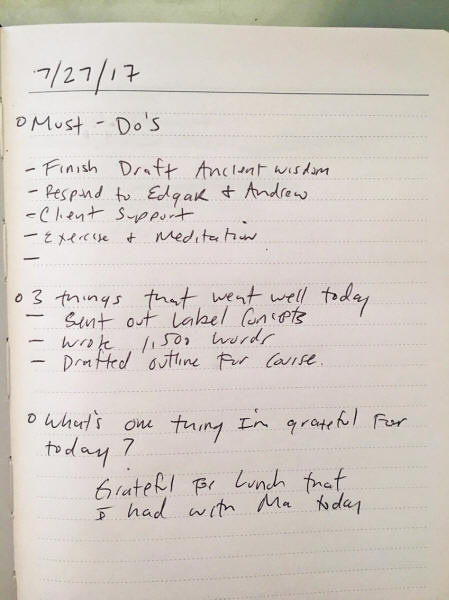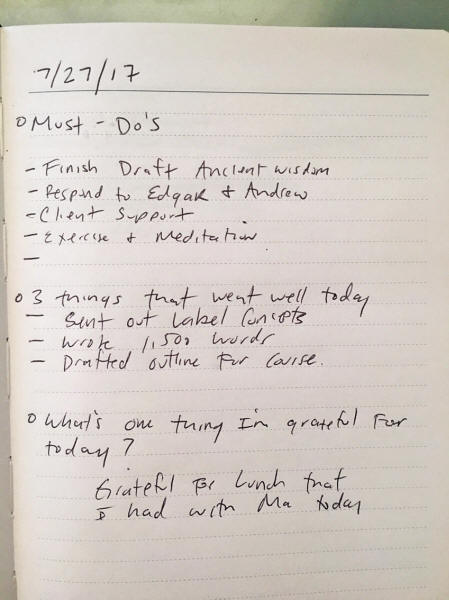|
from
BetterHumans Website
I've worked multiple jobs
doing 12-plus-hour days, six days a week, as a freelancer and
independent worker with perpetual instability for the past three
years.
I think the increased
interest is tied to a rise in both entrepreneurship and freelancing.
This philosophy is geared to equip its advocates to remain levelheaded in the midst of life's natural twists and turns. We don't have control over what happens to us, only how we respond.
These three men became
mentors for me by way of their work preserved in essays, books, and
letters.
Level Down to the
Essentials
The paradox, however, is
that doing so requires you to do less - less of the nonessential.
The through-line among peak performers is repeated bouts of focus
over a long period of time. I believe being focused is a form of tranquility, popularly known as "flow," which also happens to be the nectar of deep work.
Marcus Aurelius advocated leveling down to achieve tranquility:
Level down and do less of the nonessential to experience tranquility more often.
Our focus depends on it...
However, the evidence supporting a daily gratitude practice is substantial. A daily gratitude practice has been show to improve sleep quality, reduce snooze time, and increase the likeliness of consistent exercise and healthy eating.
Lastly and perhaps most significant, routinely giving thanks is correlated with emotional stability, reduced stress, and lowered anxiety.
These modern-day discoveries are backed by the primitive wisdom of Seneca:
A gratitude exercise doesn't need to be grandiose.
Being thankful that you have internet connection to read this article is a good place to start. A simple practice I follow is listing one thing I'm thankful for each day.
The key is to list something different every day.
Here's my entry from July 27, 2017:
Give Your Mind Regular Breaks
Back in 2010, I started a business built on naive enthusiasm.
It was all passion and no skill. The business was fine for a while, but toward the end, I flamed out and became miserable. I burned out...
Since then, I've taken a deep dive into peak performance to avoid another miserable failure like that.
This flies in the face of conventional Western wisdom that 'more is better.'
My curiosity then led me to ask,
It turns out that we are wired with a biorhythm that supports emotional and mental labor. When we orient ourselves around this concept, we are more likely to avoid burnout.
Jim Loehr, author of The Power of Full Engagement, tells us to look for signals of fatigue every 90 to 120 minutes:
These fatigue signals tell us that it's time to step away and engage in renewal.
Your renewal tactic does not need to be complex. In fact, the more familiar your choice, the better. Choose simple exercise like walking, guided meditation (so you don't have to think about what to do), or talking to a friend about non-work-related stuff.
The aim is to step away from the work while using minimal willpower or mental energy to preserve those resources when you return to work.
Giving your mind regular, intentional breaks is a solid approach to avoiding burnout. I wish I would have known about this approach back in 2010.
Brace Yourself for Uncertainty
In his Meditations, Marcus Aurelius wrote,
In her book, The Positive Power of Negative Thinking, Julie K. Norem unpacks the concept of defensive pessimism - considering the worst-case scenario so you can plan how you'd handle it.
This doesn't erase the possibility of uncertainly. Rather, it shifts your response from frantic and surprised to calmly prepared. This provides peace of mind.
Research shows that, on average, people who never worry have lower job performance than those who use their anxiety to prepare for uncertainty.
Recognize That Life Goes On After Failure
I spent five years of my life on that one failed business, and I had nothing to show for it. Or so I thought...
At first, the disaster was an open wound.
With time, the wound turned into a scar. And slowly, I became curious about why things turned out the way they did. One thing I discovered is that life goes on after a failure - even the big ones.
It'll hurt like hell, but you can come back from it.
The key is to mentally return to what is true day after day, and sometimes hour after hour. Reminding myself of the things I had agency over helped me recover from the failure.
This entire process of healing wasn't pleasurable for me, but it taught me how to be resilient.
Because of that, it brings me joy to know that I can bounce back after taking a hit to the chin.
Before You Say Yes, Survey the Decision
When you get enough practice under your belt as a creative professional, it's likely that you will start getting more opportunities than you can handle.
It's tempting to say yes as a knee-jerk reaction, but Epictetus teaches us the key to sound decisions:
I've found that being slow to decide on big decisions (taking on new projects, making a career pivot, starting a business, investing large amounts of resources or energy) is generally sound.
If I could do it again, I probably would have waited three to six more months before starting my first business to survey the opportunity before going all in.
Not all bad decisions lead to failure. Some just lead to an addiction to small successes that lead to nowhere.
Jim Harrison said,
So, with every decision, slow down and ask,
Learn and Apply Your Knowledge
Applied knowledge is better than learning the textbook. Or, put another way, don't settle for having only read the textbook.
Reading books on self-improvement, strategy, marketing, and peak performance helped me climb out of the mental ditch I'd fallen into after my business failed.
But at some point, I had to apply what I had learned in a manner that fit my work.
Reading is an art that I deem as one of the most valuable things a human can do - but if we stop at reading, then we rob ourselves of the potential wisdom from applied knowledge.
Epictetus help me learn this when he said:
Review Your Day (And My Suggested Review System)
In a letter to his older brother Novatus, Seneca describes a method he used to measure himself objectively.
At the end of each day, he'd ask himself questions like:
I've iterated on this method and use a 5/3/1 system for review and planning.
I list the five must-dos for the next day, three things that went really well today, and one thing I am grateful for.
Here again is my entry from July 27, 2017:
This no-frills technique is a simple closing ritual for me at the end of each day.
It leverages gratitude, productivity, and effective goal-setting.
There's a time and place for divergence and escapism - vacation is the ultimate mental break. But resting is not the same as hiding. Avoiding your challenges often only intensifies the anxiety of facing up to the issue.
When my business failed, I fantasized about moving to another country.
Luckily, I had my wife to level me out. I had to learn so many things, like marketing, the growth mindset, branding, emotional intelligence, copywriting, deliberate practice, email etiquette, and the art of simply showing up.
Moving wasn't going to help with any of those.
The Importance of a Few Good Friends
We live in a time of scaled human connection... ,
But how deep are these connections?
When something awful happens in your life,
The depth of a few good friendships is more important than a large quantity of acquaintances.
Here's Seneca on friendship:
And,
I leaned heavily on my wife, two friends, my brother, and my sister when I was wounded.
Interestingly enough, none of them shouted at me with strategies or solutions. Rather, they just hung in there with me and didn't leave when I had nothing.
***
In the Stoic view, bad things happen, and you need to be prepared. The good things in my life are very much a result of being able to deal with the bad things.
I hope that building your own resilience will have the same result for you...
|




